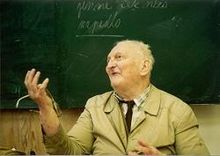Milan Machovec | |
|---|---|
 Milan Machovec at Charles University in 1999 | |
| Born | 23 August 1925 Prague, Czechoslovakia |
| Died | 15 January 2003 (aged 77) Prague, Czech Republic |
| Alma mater | Charles University |
| Notable work | Jesus for Modern Man • The Meaning of Human Existence |
| Spouse |
Markéta Hajná
(m. 1953; died 1978) |
| Children | Martin Machovec (b. 1956), Helena Machovcová (b. 1962) |
| Relatives | Dušan Machovec (younger brother) |
| Awards | Order of Tomáš Garrigue Masaryk, class III (2000) |
| Era | 20th-century philosophy |
| Region | Continental philosophy |
| School | Humanism, Marxism, Christian atheism, Czechoslovak philosophy |
| Academic advisors | Karel Svoboda |
| Notable students | Egon Bondy |
Main interests | Dialogue, humanity, ethics, history, society, theology, ecology, feminism |
Milan Machovec (23 August 1925 – 15 January 2003) was a Czech philosopher. He lectured at the Charles University in Prague in 1950–1970, in the first half of the Czechoslovak communist era. Machovec is best known for hosting Christian-Marxist dialogue among major Czech- and German-speaking thinkers in the 1960s. He was forced out of the university for his involvement in the Prague Spring of 1968 and became a dissident underground intellectual for the second half of the communist era.
In 1990, Machovec returned to his academic position for life and published his previously banned Jesus for Modern Man (Ježíš pro moderního člověka, translated into English in 1976 as A Marxist Looks at Jesus). His other works similarly sought to popularize the legacy of landmark figures, such as Jan Hus (1953), Augustine (1967) or Tomáš Masaryk (1968). He addressed his own humanist philosophy in The Meaning of Human Existence (Smysl lidské existence, 1965/2002).